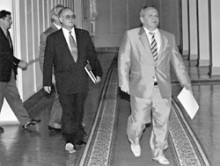At a February 9 sitting of the National Defense and Security Council President Kuchma dismissed Leonid Derkach as Chairman of the Security Service of Ukraine (SBU) and replaced him with Volodymyr Radchenko.
The Dayasked several political analysts to comment on the situation, particularly whether firing Leonid Derkach can be regarded as the regime’s attempt at a dialogue.
Oleksandr Derhachov, editor-in-chief, Political Thought:
Leonid Derkach was the weakest figure in the president’s entourage; he had no future, so he was involved in and with the latest developments considerably less than all the others. His replacement could be regarded as a concession to the opposition, although hardly anyone on Bankova Street will agree with this. Rather, they will mention other “important reasons,” the more so that this only served to strengthen the powers that be. His replacement (Volodymyr Radchenko — Ed.) seems far more professional. Apparently, no changes will be made in terms of SBU priorities or modus operandi. In this sense, Ukrainian society has fallen into a logical trap. On the one hand, in view of the events under study, firing Derkach is a symbolic gesture; on the other, what we actually need is not cadre replacements but a change in the strategy of those in power, including military and security ministries and agencies. The president and his entourage have made no moves in that direction. So the opposition should not regard what is happening as their first victory albeit a small one, because it all means building a smarter and stronger line of defense. Other replacements are possible, all meant to make no actual changes. Those at the very top show no signs of being prepared for any self-critical view of the current situation, that they will ever admit to their own mistakes, or try to change anything for the better. What changes have taken or are likely to take place in the near future will most likely testify to the regime’s determination not to make any basic changes.
Vasyl Stoyakin, political scientist (Dnipropetrovsk):
I don’t think that this replacement has anything to do with the president confronting the National Salvation Front. The point is that Leonid Derkach and government security chief Volodymyr Shepel had to be fired anyway, simply because we now have a man who worked on that security force as an officer and then made it public knowledge that he had listened in and taped the president’s conversations. Actually, whether he did or not, all those responsible for hiring that officer (meaning both the secret police and government security) must be fired. Of course, this will never happen. As for what is alleged to be a gesture of concession to the opposition, I think concession is out of the question; it is just a normal top-level executive procedure. The opposition can think what it likes; if its members feel like discussing it with the president, they might consider this a concession in their favor.
I believe that Radchenko fits better into the pattern of tasks to be solved by SBU. I regard his appointment quite positively. It’s just that I am perplexed by the president having his substitution bench empty, as usual. Radchenko is rather well known in his domain; he has been appointed to similar posts. Of late, we have been witness to a trend with people being reshuffled in terms of rank and position, yet retaining their specific narrow circle. There are people representing certain groups and movements considered outsiders in that narrow circle, getting minor jobs with the cabinet.
Volodymyr Fesenko, political scientist:
Leonid Derkach was fired in a manner allowing the president to save face as a politician; besides, if not the opposition, then the general public might view this as a gesture of good will, as the president being prepared to begin a dialogue. Be it as it may, Ukrainian society does need this dialogue to get out of its political crisis, with both those in power and opposition taking steps in that direction. As it is, Derkach’s replacement could be viewed as a gesture of good will of sorts. Another thing is whether the opposition will reciprocate, at least by agreeing to consultations with some people or parties from the presidential camp to look for a way out of the political crisis.
I think that Derkach’s dismissal may have a positive effect on future events, considering that Radchenko is not loathed by the opposition, and that the new SBU chief, being politically unaffiliated (at least outwardly), signifies a positive development. Yet we have two other stumbling blocks: Potebenko and Kravchenko. Here the situation is much more complicated. Simply firing either of them could be regarded by the opposition as the president getting weak, something he will not allow, of course. In other words, the president might be looking for an appropriate and acceptable manner in which to make both step down.







